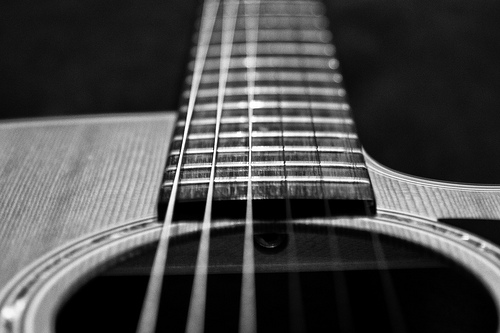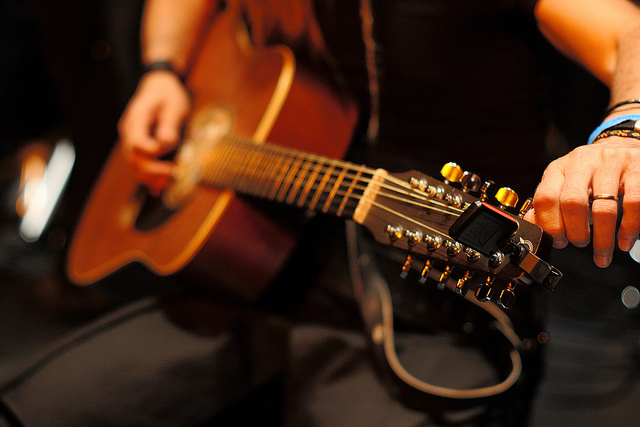
Being a great guitarist isn’t just about playing the right chords at the right time, it is about looking after your guitar and caring for it properly. Guitars are delicately balanced tools, and like all other wooden instruments need to be properly cared for if you want them to stay looking and sounding their best.

Temperature and Humidity
Temperature and humidity can have a huge effect on both the tone and playability of a guitar. If there is too much moisture in the air a guitar can swell, and too little can cause the guitar to shrink. This ultimately leads to a change in the shape of the guitar, and can cause warping.This is what then effects the tone and playability. Temperature can also have a huge effect on a guitar, as if it is too hot this can lead to weakening of glue joints, and too cold can cause cracking of the finish.
So what can you do? The best thing to do is to keep your guitar at a temperature where none of these factors are stressed. The ideal temperature for storing guitars is 18-24c, and humidity should be around 45-55%. Using a cheap electric hygrometer, you can monitor both temperate and humidity in the vicinity where your guitar is stored, and make changes if you need to.
Cleaning
After we use a guitar we leave them covered in dirt and sweat, even if we can’t see it. While this might not seem like the most dangerous of things, this can slowly break down the finish on your guitar and in some cases discolour and damage the wood. After using your guitar, give it a quick rub down with a lint free cloth to remove some of the fresh dirt. Every so often you will want to give your guitar a good clean to remove any build up of dirt.
For cleaning the lacquer body of the guitar, the best thing to use is methylated sprits. This will not leave any residue on the surface, and will remove any sweat or dirt. You only need to use a very small amount on a cloth, and wipe clean after applying. For the fret board and strings, just use a microfiber cloth. If the strings need a really good clean you can soak them in methylated spirits for 12-24 hours, and this will remove dirt and grime, making them feel as good as new. If the fret board is looking dirty or dry, use a lemon oil to cleanand rejuvenate the wood, as it can become dry over time.
Regular Maintenance
Other than cleaning your guitar regularly, you should also conduct regular maintenance checks.Do this every 3-6 months, depending how often you use your guitar. This is the time when you should tighten any screws or bolts and clean or change strings. When you are changing strings, you should never change one or two strings, you should always change an entire set. This is because old strings sound very different to new, so the whole set should be changed so they all sound the same. Also rub a pencil in the nut where the strings sit to help lubricate the strings, and improve their life span.
If some work needs doing, don’t be afraid to try it yourself. Doing your own work on your guitar is a lot cheaper, and it helps you understand how your guitar works. Also if anything goes wrong in the future you can fix it yourself. There are hundreds of tutorials and guides online telling you how to fix things like this yourself.
What to use
Another important part of guitar ownership is knowing what and what not to use on your guitar. While some products might be perfectly fine, others could be extremely damaging, and you could use them without ever being aware you are doing so. For cleaning your guitar, a rule of thumb is toavoid any domestic cleaning products, unless you know it’s safe or have be advised to use them by an expert. This is because these cleaners contain so many chemicals it hard to guarantee their safety. Avoid using products that contain heavy metals, lacquer thinners, silicone or bleaches, as these could be highly damaging to your instrument.
When it comes to refinishing or repairing your guitar it can be hard to find guitar safe products from general DIY store, but you can find loads ofguitar finishing supplies online at our store or on other guitar and luthier sites. If you do have any questions either search online forums and article, or contact manufactures or suppliers directly, as they will know more about the products than most.
This article was written by Merv Jones from Wood Finishes Direct, who stock a range of wood products suitable for cleaning, repairing and re-finishing guitars.Merv been playing, repairing and re-finishing guitars for more than 30 years, and has built up a wealth of knowledge on the subject.
Are you a guitarist? Check out our full range of online guitar lessonsAre you a saxophonist? Check out our full range of online saxophone lessons
Subscribe to Pro Music Tutor from as little as £7.99 per month
Related Posts
-
The Benefits of Online Music Education
Learning music has never been easier, since the internet and modern technological advancements have opened the doors to countless possibilities, expanding the subjects people can choose from and how the lessons are taught. Now, people can study a whole host of music-related topics; from learning to play guitar or DJing, to understanding the inner workings […]
View All >> -
Essential Jazz Guitar Scales that are Easy to Learn
Improvising in jazz requires the ability to play in different keys over different chords. Results certainly do not come overnight, but with diligent practice, you would be surprised by what you can achieve. Many people ask me about what scales I use as if they were some big secret. While knowing your scales is very […]
View All >>
Latest Blog Entries
-
The Benefits of Online Music Education
Learning music has never been easier, since the internet and modern technological advancements have opened the doors to countless possibilities, expanding the subjects people can choose from and how the lessons are taught. Now, people can study a whole host of music-related topics; from learning to play guitar or DJing, to understanding the inner workings […]
View All >> -
Essential Jazz Guitar Scales that are Easy to Learn
Improvising in jazz requires the ability to play in different keys over different chords. Results certainly do not come overnight, but with diligent practice, you would be surprised by what you can achieve. Many people ask me about what scales I use as if they were some big secret. While knowing your scales is very […]
View All >>
Blog Categories
- Categories
- Guitar Tips (93)
- History (36)
- How-To (38)
- Interviews (3)
- Music Industry (121)
- Prolinks Guitar (2)
- Prolinks Lessons (3)
- Prolinks Tutor's Profile (1)
- Saxophone Tips (40)
- Uncategorized (6)
Tags
Archive
- November 2018 (1)
- February 2018 (1)
- December 2017 (1)
- November 2017 (1)
- October 2017 (1)
- July 2017 (4)
- May 2017 (2)
- April 2017 (1)
- August 2016 (2)
- July 2016 (1)
- June 2016 (2)
- May 2016 (3)

